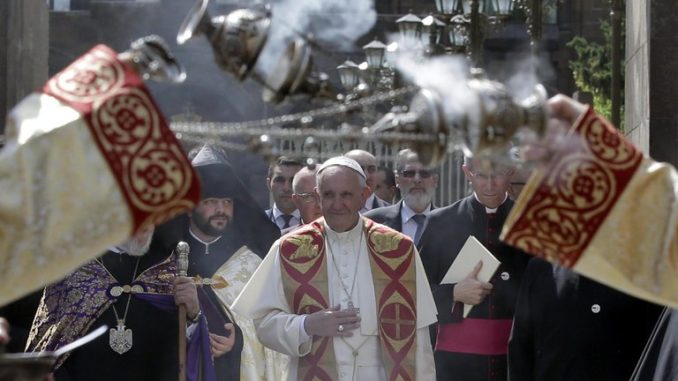
ROME թ§Չ-Չ Pope Francis waded into turbulent geopolitical waters once again on Friday during his first visit to Armenia when he made an unscripted remark referring to the World War I-era massacre of an estimated 1.5 million Armenians by Ottoman Turks as a genocide.
The prepared text of his speech did not include the politically contentious word, which generally draws furious reactions from Turkey. Instead, the text opted for the more veiled Armenian expression թ§Չ-ժmetz yeghern,թ§Չ-Թ which translates as the թ§Չ-ժgreat evil.թ§Չ-Թ
But in keeping with his penchant for blunt talk, the pontiff said Friday that թ§Չ-ժthat tragedyթ§Չ-Թ had been թ§Չ-ժa genocideթ§Չ-Թ and was թ§Չ-ժthe first of the deplorable series of catastrophes of the past century, made possible by twisted racial, ideological or religious aims that darkened the minds of the tormentors even to the point of planning the annihilation of entire peoples.թ§Չ-Թ
Francisթ§Չ-Չ§ words were met with a standing ovation by President Serzh Sargsyan of Armenia and other officials and diplomats who gathered at the presidential palace in Yerevan, the nationթ§Չ-Չ§s capital, to hear the pope.
There was no immediate reaction from Turkish leaders. Turkey has disputed the genocide designation, arguing that it was wartime and that many Turks were killed as well. And it has insisted that there was never a systematic plan to execute Armenians.
The suffering and resilience of the Armenian people was the main theme of the first day of the popeթ§Չ-Չ§s three-day trip to the Caucasus region. His speeches also underscored the importance of dialogue and cooperation to overcome conflict թ§Չ-Չ a tacit acknowledgment of Armeniaթ§Չ-Չ§s continuing frictions with its neighbors Turkey and Azerbaijan.
թ§Չ-ժMay all join in striving to ensure that whenever conflicts emerge between nations, dialogue, the enduring and authentic quest of peace, cooperation between states and the constant commitment of international organizations will always prevail,թ§Չ-Թ the pope said.
Armenia has no diplomatic relations with Turkey. It has also locked horns with Azerbaijan over the disputed province of Nagorno-Karabakh since they both broke free from the Soviet Union.
The choice to begin the journey with Armenia is in line with the popeթ§Չ-Չ§s թ§Չ-ժdifferent geopolitical map of the world,թ§Չ-Թ said Alberto Melloni, a historian of the Vatican.
Mr. Melloni noted that the pope has tended to թ§Չ-ժstart with small countries, before approaching larger powers,թ§Չ-Թ and that his visits to the Caucasus could be seen as a preliminary approach to Russia, թ§Չ-ժwhich is the Vaticanթ§Չ-Չ§s real issue թ§Չ-Չ what to do with Russia and China, the great superpowers of the century.թ§Չ-Թ
Originally, the pope had planned to include Georgia and Azerbaijan in his trip, but visits to those countries have been postponed until autumn.
As the leader of one billion Roman Catholics, Francis also spoke Friday about the plight of Christians in the Middle East, where he said they suffer persecution and discrimination թ§Չ-ժperhaps even more than at the time of the first martyrs.թ§Չ-Թ
թ§Չ-ժIt is vitally important that all those who declare their faith in God join forces to isolate those who use religion to promote war, oppression and violent persecution, exploiting and manipulating the holy name of God,թ§Չ-Թ he said.
Before leaving Rome, Francis said he would go to Armenia as a pilgrim թ§Չ-ժto the first Christian country.թ§Չ-Թ Armenia adopted the faith in 301, and the Armenian Apostolic Church, which broke with other Christian churches in the fifth century over a theological dispute, counts about 93 percent of Armeniaթ§Չ-Չ§s population of three million as adherents. By contrast, the country has only about 280,000 Roman Catholics.
Msgr. Gabriel Quicke, a Vatican official who works to promote unity with other Christian churches, said relations with the Armenian Apostolic Church have been strong since the Second Vatican Council 50 years ago.
While in Armenia, the pope plans to visit the Tsitsernakaberd Memorial Complex, the countryթ§Չ-Չ§s main monument to the Armenian genocide in Yerevan. He is expected to lay a wreath there and meet with descendants of Armenian orphans who were given refuge at the papal summer residence in Castel Gandolfo, Italy, during the years of the killings, from 1915 to 1923. He also plans to visit a monastery near Mount Ararat, where the Bible says Noahթ§Չ-Չ§s ark landed after the Great Flood.
The pontiffթ§Չ-Չ§s recognition of the Armenian genocide has drawn praise from Armenians and Armenian Americans.
Karekin II, the patriarch of the Armenian Apostolic Church, told the pope on Friday that people remembered, թ§Չ-ժwith gratitude,թ§Չ-Թ Francisթ§Չ-Չ§ թ§Չ-ժhistoric sermon condemning the genocideթ§Չ-Թ at St. Peterթ§Չ-Չ§s Basilica last year. And Aram Hamparian, executive director of the Armenian National Committee of America, issued a statement saying թ§Չ-ժthe pope is both strengthening Christian solidarity with Armenia and taking a courageous stand for truth and justice.թ§Չ-Թ
nytimes.com


Be the first to comment